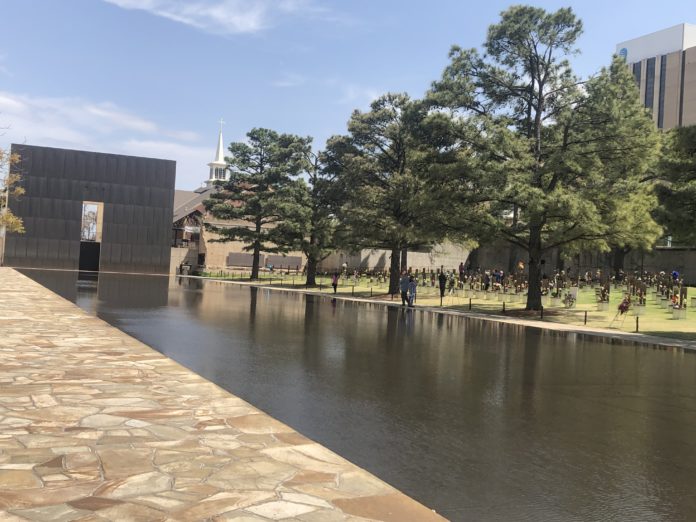At exactly 9:02 a.m. on April 19, 1995, I was just finishing breakfast at The Patio restaurant on Classen Circle in Oklahoma City. Richard, the cook there for decades, always prepared my meal perfectly. I paid up, tipped and thanked Richard, then hopped in my old Lincoln and headed to the Capitol for what I presumed would be another busy day either passing legislation in the Senate or trying to kill it.
Legislation wasn’t the only thing being killed that day. So, also, were 168 innocent victims of Army veteran and bomber Timothy McVeigh, who decided they and others were at fault for what happened in Texas, at Waco, nearly three years earlier in August 1992.
But, of course, I didn’t know any of that information, yet on that otherwise sunny and mild April morning now more than a quarter a century ago.
As I walked into the west entrance to the Capitol, a state trooper said I should go directly to the Senate chamber which was a little unusual but I did, still oblivious to what had happened downtown at the Murrah Federal Building. It was only when I took my seat on the back row in the ornate chambers that I sensed something was out of the ordinary because my desk was covered with a bit of white powdery substance. No, not that. It was from the ceiling panels that had loosened and released material that floated down in the seconds following the blast at the Murrah Building.
Very shortly Senate President Pro Tem Stratton Taylor of Claremore, a man I would succeed in 2003, gaveled our session to order, explained there had been a horrific explosion southwest of where we sat and directed that we adjourn immediately and he further suggested we should return to our homes scattered throughout the state.
Most of my 47 colleagues did. I didn’t because by the time I got to my office, also located on the fourth floor, my executive assistant, Lorna Stillwell, told me I had been ordered over to the Oklahoma Military Department on NE 36th Street and it was only then, when I arrived around 10:00 a.m. and walked into a meeting of the state staff, that the extent of the tragedy began to unfold.
I stayed on extended active duty for a period of time, serving in my role as public affairs officer for the Oklahoma Air National Guard, reporting directly to the Adjutant General, Major Gen. Stephen Cortright.
It was during those following days and nights, as we headquartered under the old Southwestern Bell Building and now the Oklahoma City University Law School, that I witnessed, first-hand, so many acts of bravery, generosity, courage and heartbreak by hundreds, probably thousands, of my fellow citizens, in uniform or not. Little snippets will never escape my brain.
Examples follow:
The young man with bright red hair from Lexington who worked 24/7 it seemed for the state medical examiner, always directly involved in the recovery of victims; Gov. Frank Keating, always calm, in control as commander-in-chief, never allowing rumors to gain substance by dealing only with known facts when making his decisions; Gen. Cortright, Vietnam fighter pilot and Tulsa lawyer, leading by example with determination and wisdom; the nurses, doctors, firemen, police, military from many units and commands, always putting their training and skills to the best possible use; and the hundreds of volunteers who showed up day after day to comfort families, feed them, pray for and with them; and never once did I observe any person, regardless of grade, rank, party preference, heritage, sexual orientation, race, education or any other human characteristic or qualification do anything except their very best in a situation of domestic terror like our country had never seen before.
Later that same first week after the bombing, there was a speech I couldn’t get out of giving over at the OU Health Sciences Center, just outside of the Bird Auditorium. I had been invited by my friend and OUHSC executive Herschel Lamirand to give remarks on behalf of the Senate and I had prepared a short commentary about why what the upper chamber [the Senate, of course] wanted to accomplish before the session ended; why the positions taken by our colleagues in the House and ,of course, Gov. Keating were certainly inferior to the plan I would advocate that early morning, within 72 hours of the murderous act that had changed our state and nation forever.
It had changed me too. I started reading my speech, couldn’t proceed, folded it into my coat pocket and instead said, without remembering a word of it today, what was on my human heart and not what was in my always political head. And I’m glad I did.
Then, I returned to my seat and for the first and only time in a public setting began to cry and couldn’t stop just as I am doing right now but privately – this morning in my home in Lexington – as I often do at 9:02 a.m. annually on April 19.
The world needs you and I to be kind to someone, or even better, to somebodies today, unlike what was done to so many innocents, including 19 children, in downtown Oklahoma City 27 years ago.
Excuse me. It’s 9:02 a.m. and I have something to do that is important.
Remember.







